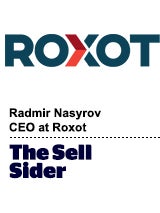“The Sell Sider” is a column written for the sell side of the digital media community.
Today’s column is written by Radmir Nasyrov, CEO at Roxot.
I believe Apple’s Intelligent Tracking Prevention (ITP), ITP 2.0, the EU’s General Data Protection Regulation and similar privacy initiatives will change programmatic advertising as we know it today.
In a cookie-less environment, advertisers can’t personalize ads to specific users. Therefore, the value offered by programmatic advertising compared to other advertising channels will be lost.
With the tremendous reallocation of marketing budgets, publishers will suffer the most. Index Exchange’s Andrew Casale delivered a keynote speech last May where he said ad requests without a buyer ID, or a unique key used for matching users, receive 99% lower bids than the same ad request with the identifier. That points to significant loss in programmatic revenue if all ad requests lack cookie or user ID.
More recently, Google’s Sean Downey commented at Industry Preview that he’s seen statistics indicating that publishers’ CPMs may be cut in half due to ITP.
Currently, only Safari restricts third-party cookies by default. Mozilla is planning to join the trend in the near future. In the eyes of a publisher, Safari and Firefox users become similar to users with ad blockers: They consume publishers’ content but do not generate ad revenue that publishers can rely on. Safari and Firefox combined make up 16% of US desktop traffic and 50% of mobile traffic, according to StatCounter Global Stats.
New privacy-protecting initiatives created a scarcity on the market that publishers can take advantage of to cover potential losses.
Publishers need to focus on maximizing their inventory value. With Safari and Firefox users going dark for advertisers, more of their budgets will be attributed to trackable users. Packaging premium placements only with Chrome users and pricing them accordingly may be a successful tactic in the near term.
Despite the significant revenue loss in the short-term, there could be a path for publishers to move back toward their strong position in the market. Publishers’ first-party data about user interests and behavior may become a main form of targeting for advertisers. Using key-value pairs to segment audiences by their demographics and content consumed, publishers can offer buyers a new source of reliable audience data. This approach would eliminate unnecessary middlemen and attribute more value and, therefore, revenue to publishers.
However, first-party audience data needs to be standardized and passed in ad requests to become a dominant form of behavioral targeting. This solution, like any other, requires collaboration of all parties within the ecosystem, including publishers, ad tech vendors, buyers and regulators.
Even considering that advertisers now pay more attention to the context they buy ads against, I have no doubt that programmatic advertising will continue to rely on some kind of user identification. That’s essential for brands and advertisers to establish effective communication with potential and existing customers.
Follow Roxot (@roxot_team) and AdExchanger (@adexchanger) on Twitter.












